
A teacher instructing girls at an open air class in the garden of Glasgow Reformatory for Girls at East Chapelton in Bearsden, c 1890. The reformatory (founded in 1854) moved from Rottenrow to Bearden in 1870. The countryside location was preferred because the girls could be taught in healthier surroundings there, away from the malign influences to be found in the city.
Another advantage of a rural setting was that it allowed the institution to be self-supporting. Livestock such as horses, cows, ponies and hens were kept there, providing food as well as subjects for study. The range of outbuildings included stables for the animals. Vegetables were grown in the garden. The girls washed their own clothes and those of local residents in the Reformatory's large laundry.
Reference: Heatherbank Museum of Social Work, print 881
Reproduced with the permission of Glasgow Caledonian University, Research Collections, Heatherbank Museum of Social Work
Keywords:
education, gardens, girls, Glasgow Reformatory for Girls, playing fields, reformatories, stables, teachers, women
You have 0 images in your photo album.